Title search results
Showing 1 - 20 of 9330 items
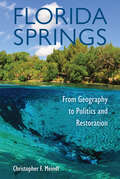
Florida Springs: From Geography to Politics and Restoration
By Christopher F. Meindl. 2024
Florida Book Awards, Gold Medal for Florida NonfictionAmerican Association of Geographers Globe Book Award for Public Understanding of GeographyAn indispensable…
resource for learning about the freshwater wonders of Florida Florida is home to over 1,000 freshwater springs, natural wonders that have drawn people to enjoy and interact with them over the course of millennia. This book provides a clear and comprehensive overview of the geography, history, science, and politics of the springs, informing readers about the deep past and current issues facing these treasures of the Florida landscape. Christopher Meindl explains the unique physical features of Florida’s springs, including the “swiss cheese” structure of the state’s aquifers and the complexities of its groundwater hydrology, providing helpful maps, graphs, and photos. Meindl discusses how ancient and modern people have used the springs—as centers of communities, therapeutic spas, roadside attractions, parks, and more. He addresses contemporary threats to the springs in areas such as water flow, water quality, and overcrowding. Finally, he explores recent state policies, the activism of environmentalists, and current and potential restoration projects that seek to prevent springs degradation. Meindl brings to light a struggle for truth among scientists, politicians, and businesspeople about the causes of problems the springs face today. Challenging oversimplified answers and looking at multiple hypotheses, Meindl raises intriguing questions that will inspire readers to join the ongoing discussion about how best to protect and restore Florida’s iconic freshwater sanctuaries.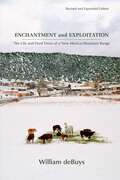
First published in 1985, William deBuys&’s Enchantment and Exploitation has become a New Mexico classic. It offers a complete account…
of the relationship between society and environment in the Sangre de Cristo Mountains of northern New Mexico, a region unique in its rich combination of ecological and cultural diversity. Now, more than thirty years later, this revised and expanded edition provides a long-awaited assessment of the quality of the journey that New Mexican society has traveled in that time—and continues to travel.In a new final chapter deBuys examines ongoing transformations in the mountains&’ natural systems—including, most notably, developments related to wildfires—with significant implications for both the land and the people who depend on it. As the climate absorbs the effects of an industrial society, deBuys argues, we can no longer expect the environmental future to be a reiteration of the environmental past.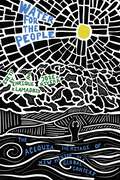
Water for the People: The Acequia Heritage of New Mexico in a Global Context (New Century Gardens and Landscapes of the American Southwest)
By Enrique R. Lamadrid and José A. Rivera. 2023
Winner of the Historical Society of New Mexico Fray Francisco Atanasio Domínguez Award Winner of the 2024 New Mexico-Arizona Book…
Award for History Anthology Water for the People features twenty-five essays by world-renowned acequia scholars and community members that highlight acequia culture, use, and history in New Mexico, northern Mexico, Chile, Peru, Argentina, Spain, the Middle East, Nepal, and the Philippines, situating New Mexico&’s acequia heritage and its inherent sustainable design within a global framework. The lush landscapes of the upper Río Grande watershed created by acequias dating from as far back as the late sixteenth century continue to irrigate their communities today despite threats of prolonged drought, urbanization, private water markets, extreme water scarcity, and climate change. Water for the People celebrates acequia practices and traditions worldwide and shows how these ancient irrigation systems continue to provide arid regions with a model for water governance, sustainable food systems, and community traditions that reaffirm a deep cultural and spiritual relationship with the land year after year.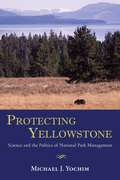
Protecting Yellowstone: Science and the Politics of National Park Management
By Michael J. Yochim. 2013
Yellowstone National Park looks like a pristine western landscape populated by its wild inhabitants: bison, grizzly bears, and wolves. But…
the bison do not always range freely, snowmobile noise intrudes upon the park&’s profound winter silence, and some tourist villages are located in prime grizzly bear habitat. Despite these problems, the National Park Service has succeeded in reintroducing wolves, allowing wildfires to play their natural role in park forests, and prohibiting a gold mine that would be present in other more typical western landscapes.Each of these issues—bison, snowmobiles, grizzly bears, wolves, fires, and the New World Mine—was the center of a recent policy-making controversy involving federal politicians, robust debate with interested stakeholders, and discussions about the relevant science. Yet, the outcomes of the controversies varied considerably, depending on politics, science, how well park managers allied themselves with external interests, and public thinking about the effects of park proposals on their access and economies. Michael Yochim examines the primary influences upon contemporary national park policy making and considers how those influences shaped or constrained the final policy. In addition, Yochim considers how park managers may best work within the contemporary policy-making context to preserve national parks.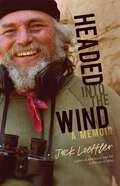
Headed into the Wind: A Memoir
By Jack Loeffler. 2019
With the temperament of Santa Claus and the tenacity of a badger, Jack Loeffler reveals his compassion and concern for…
Southwestern traditional cultures and their respective habitats in the wake of Manifest Destiny. Working both as an individual and with comrades—including Edward Abbey and Gary Snyder—he was part of an early coterie of counterculturalists and environmentalists who fought to thwart the plunder of natural resources in the Southwest. Loeffler, a former jazz musician, fire lookout, museum curator, bioregionalist, and self-taught aural historian, shares his humor and imagination, his adventures, observations, reflections, and meditations along the trail in his retelling of a life well lived. In this honest memoir, he advises each and every one of us to go skinny-dipping joyfully in the flow of Nature to better understand where we&’re headed.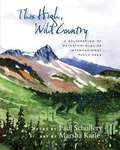
This High, Wild Country: A Celebration of Waterton-Glacier International Peace Park
By Paul Schullery. 2010
For centuries, the spectacular landscapes now protected in Waterton-Glacier International Peace Park have amazed and inspired us. Historian-naturalist Paul Schullery…
and artist-illustrator Marsha Karle bring us a new and richly textured portrait of this magnificent region and reveal why Waterton-Glacier is a world treasure.Through Schullery's text and Karle's watercolors and drawings, we crisscross the roads and trails of this magnificent wilderness. We learn its deep geological history and encounter its wild residents. And we discover its ever-increasing value as a barometer of planetary health in today's rapidly changing world.Schullery, who has been described as the foremost citizen of the American national parks, and Karle, whose art is informed by a National Park Service career in some of North America's most beautiful landscapes, combine their talents to create a memorable tale of the beauty, power, and peril of this high, wild country.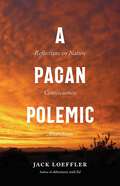
A Pagan Polemic: Reflections on Nature, Consciousness, and Anarchism
By Jack Loeffler. 2023
A Pagan Polemic curates the evolving perspective of Jack Loeffler—itinerant wanderer, environmental warrior, storyteller, and story collector—whose true education began…
when he was marched into the Nevada desert one day at dawn to play &“The Stars and Stripes Forever&” during an atomic bomb test a scant few miles away. Since that day in 1957, Jack&’s mission in life has been to record peoples of the borderlands and to bring &“Indigenous mindedness&” to the forefront of the conversation about our precarious environments and our decaying planet. A Pagan Polemic is a sweeping manifesto of Jack&’s core beliefs and long experience as a fierce (and funny) advocate for Nature and Nature-mindedness and against poisonous politics and policies.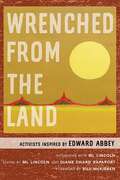
Wrenched from the Land: Activists Inspired by Edward Abbey
By Ml Lincoln. 2020
Wrenched from the Land features sixteen interviews with some of the most iconic eco-warriors to put themselves on the line…
for their beliefs. The activists featured in this book are inspired by the late Edward Abbey, one of America&’s uncompromising and irascible defenders of wilderness. The book includes interviews with Terry Tempest Williams, the late Charles Bowden, Sea Shepherd Society founder Paul Watson, Jack Loeffler, Doug Peacock, Ingrid Eisenstadter, John De Puy, Bob Lippman, Derrick Jensen, Shonto Begay, Ken Sanders, Ken Sleight, the late Katie Lee, Executive Director of the Center for Biological Diversity Kieran Suckling, Earth First! cofounder Dave Foreman, and climate activist Tim DeChristopher.Some were among Abbey&’s closest friends and were the inspiration for his irreverent comedic masterpiece, The Monkey Wrench Gang. Here are mesmerizing stories about how they adapted Abbey&’s monkeywrenching ideas into a radical blueprint for direct action. Their achievements—as ingenious and fierce as the individuals in this book—will encourage readers to discover their own pathways toward positive change.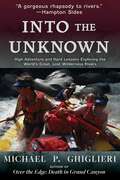
Into the Unknown: High Adventure and Hard Lessons Exploring the World's Great, Lost Wilderness Rivers
By Michael P. Ghiglieri. 2024
Veteran wilderness guide Michael P. Ghiglieri takes you into the unknown—among white-water rapids, crocodiles, hippos, gorillas, lions, and impossible waterfalls.…
His riveting memoir not only serves up true high adventure, it also presents the ecology, natural history, conservation (or the lack of it), and exploration history of nine far-flung wilderness regions across the globe—including the never-to-be-repeated white-water run on the Colorado River through the Grand Canyon during the Bureau of Reclamation’s 1983 super flood of ninety-seven thousand cubic feet per second; the first summit-to-sea descent of the Alas River exploring Sumatra’s new Gunung Leuser National Park, a last redoubt for wild orangutans and other rare species; and the “impossible” run of the Alsek River from the Yukon to Alaska in the world’s largest international conservation area.Into the Unknown reveals what the natural world looks like through a professional’s eyes during “adventure” travel, when things start sliding toward the edge. This insider memoir recounts ten sagas of extreme expeditions into Earth’s most amazing wilderness regions to illustrate their realities, science, allure, history, risks to life and limb, and ultimate fates. Many of these regions have now vanished to “progress.” Others are imperiled. Only a few are protected. But all are, or were, places where exotic beauty and danger are inseparable.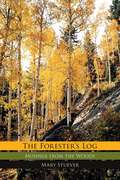
The Forester's Log: Musings from the Woods
By Mary Stuever. 2009
When Mary Stuever graduated from forestry school in the early 1980s, her profession was facing tremendous challenges as the nation's…
forests were poised for serious decline from catastrophic wildfires, insect outbreaks, and suburban encroachment. Stuever captured this transition over the last few decades in her syndicated monthly column The Forester's Log. Originally penned for newspapers in rural forested communities in the Southwest, the column has found its way into various magazines, newsletters, anthologies, and Web sites.Stuever's career involves firefighting, fire rehabilitation, timber sale administration, environmental education, and many other aspects of forest management. Through her work with native tribes, local, state, and federal agencies, and private landowners, Stuever focuses on the important bond between land and people. With an inspiring and informative style, Stuever's tales weave fresh insight into forest issues. Her writings, collected here for the first time, tell the poignant story of places, people, and experiences that have shaped her passion while offering a rare glimpse of forestry in the Southwest at the turn of the new millennium.
House Gods: Sustainable Buildings and Renegade Builders
By Jim Kristofic. 2022
Our buildings are making us sick. Our homes, offices, factories, and dormitories are, in some sense, fresh parasites on the…
sacred Earth, Nahasdzáán. In search of a better way, author Jim Kristofic journeys across the Southwest to apprentice with architects and builders who know how to make buildings that will take care of us. This is where he meets the House Gods who are building to the sun so that we can live on Earth. Forever.In House Gods, Kristofic pursues the techniques of sustainable building and the philosophies of its practitioners. What emerges is a strange and haunting quest through adobe mud and mayhem, encounters with shamans and stray dogs, solar panels, tragedy, and true believers. It is a story about doing something meaningful, and about the kinds of things that grow out of deep pain. One of these things is compassion—from which may come solace. We build our buildings, we make our lives—we are the House Gods.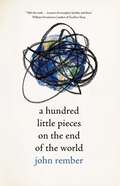
A Hundred Little Pieces on the End of the World
By John Rember. 2020
Written with clarity, tenacity, humor, and warmth, A Hundred Little Pieces on the End of the World attempts to find…
tolerable ethical positions in the face of barely tolerable events—and the real possibility of an intolerable future. It is a compelling, surprising, disturbing, and highly literate work of reportage and contemplation. It is both a collection of gentle-spirited wisdom and a rumination on ruin, as if distilled in equal measure from the spirits of Norman Maclean&’s A River Runs Through It and Cormac McCarthy&’s The Road.Through these ten essays, each further broken into ten smaller pieces, Rember examines the practical and ethical dilemmas of climate change, population, resource depletion, and mass extinction. At the same time, he never forgets those improbable connections between human beings that lead to moments of joy, empathy, and grace.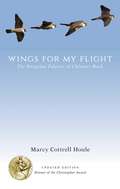
Wings for My Flight: The Peregrine Falcons of Chimney Rock, Updated Edition
By Marcy Cottrell Houle. 1991
&“Blends adventure, romance, humor and pathos. . . . Offers vivid descriptions of her sky-diving subjects and the seductive beauty…
of the wilderness.&”—Chicago Sun-Times&“Well crafted and compelling, a dramatization of the classic conflict between the legitimate interests of conservationists and developers. This is a fine book on several levels, as science, sociology, or a story. Highly recommended.&”—Library JournalForty years ago, the peregrine falcon was on the U.S. endangered species list and many doubted that it would survive. Marcy Houle was a young wildlife biologist observing one of the last remaining pairs—located at a site in southwest Colorado slated for development as a major tourist site. First published in 1991 and winner of several national awards, this book chronicles her work at Chimney Rock along with the recovery of the species. A new preface examines the last thirty years of the peregrine population and its remarkable comeback and culminates with President Barack Obama&’s designation of Chimney Rock as a national monument.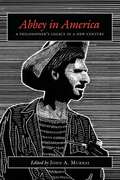
Abbey in America: A Philosopher's Legacy in a New Century
By John A. Murray. 2015
More than twenty-five years after his death, iconic writer and nature activist Edward Abbey (1929–1989) remains an influential presence in…
the American environmental movement. Abbey&’s best known works continue to be widely read and inspire discourse on the key issues facing contemporary American society, particularly with respect to urbanization and technology. Abbey in America, published forty years after Abbey&’s popular novel The Monkey Wrench Gang, features an all-star list of contributors, including journalists, authors, scholars, and two of Abbey&’s best friends as they explore Abbey&’s ideas and legacy through their unique literary, personal, and scholarly perspectives.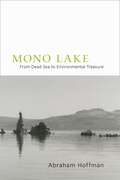
Mono Lake: From Dead Sea to Environmental Treasure
By Abraham Hoffman. 2014
Mono Lake is one of the largest lakes in California, and Californians have been using it, enjoying it, and abusing…
it since nomadic northern Paiutes began hunting the lake&’s vast bird populations. Controversy between environmentalists and the City of Los Angeles brought so much attention to Mono Lake in the late twentieth century that it became best known for its appearance on &“Save Mono Lake&” bumper stickers. This thoughtful study is the first book to explore the lake&’s environmental and cultural history.Hoffman writes about gold mining in the Mono Basin; the taking of birds and their eggs to supply food for miners and townspeople; a failed oil boom; efforts to develop recreational activities such as a state-operated marina, which also failed; catastrophes including plane crashes and the testing of bombs underwater; and litigation over the diversion of creeks flowing into the lake and the resulting decline in the lake level. A variety of photographs, some never before published, ranging from mining to motor boat races in the 1930s are also included.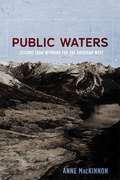
Public Waters: Lessons from Wyoming for the American West
By Anne MacKinnon. 2021
Wyoming&’s colorful story of water management illuminates the powerful forces that impact water use in the rural American West. The…
state&’s rich history of managing this valuable natural resource provides insights and lessons for the twenty-first-century American West as it faces drought and climate change. Public Waters shows how, as popular hopes and dreams meet tough terrain, a central idea that has historically structured water management can guide water policy for Western states today.Drawing on forty years as a journalist with training in water law and economics, Anne MacKinnon paints a lively picture of the arcane twists in the notable record of water law in Wyoming. She maintains that other Western states should examine how local people control water and that states must draw on historical understandings of water as a public resource to find effective approaches to essential water issues in the West.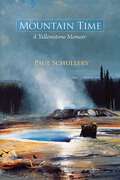
Mountain Time: A Yellowstone Memoir
By Paul Schullery. 2008
Mountain Time, a thoughtful and often moving work, is not only about Yellowstone as a superb sample of American wildness,…
. . . but also about a man named Paul Schullery and his relationship to it. This fact gives the book much richness and power, for Schullery comes across clearly as a caring, observant, undogmatic person whose reasonable and intelligent opinions are reinforced by plenty of facts. In a certain mood, it is possible to wish (vainly) that people of his civilized caliber were the only ones allowed to open their mouths very widely on any subject that really matters, as Yellowstone definitely does.--John Graves, author of Goodbye to a River and From a Limestone LodgePaul has pushed outdoor writing to new limits. I pay him the highest compliment I can: I wish I had written Mountain Time.--Lionel Atwill, Sports Afield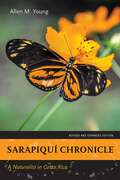
Sarapiquí Chronicle: A Naturalist in Costa Rica. Revised and Expanded Edition.
By Allen M. Young. 2017
&“Young . . . brings the trained eye of an entomologist and an unabashed admiration for the beauty of nature…
to this engaging and informative account of his experiences during twenty-one years of fieldwork in Costa Rica&’s rainforests.&”—Publishers Weekly&“A splendid read. For newcomers to the moist tropics, and for any but the most sated old-timers, it can be commended for an entertaining account of a locality where life is lived to the full—by all species, including the human observer.&”—Norman Myers, New ScientistThe abundant insect life of the rainforests of northeastern Costa Rica is the subject of this engaging book, first published over twenty-five years ago and now including two new chapters on the rise of ecotourism in the region.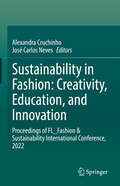
Sustainability in Fashion: Proceedings of FL_Fashion & Sustainability International Conference, 2022
By Alexandra Cruchinho, José Carlos Neves. 2025
Sustainability in Fashion: Creativity, Education, and Innovation is a book that focuses on how sustainability can be integrated into the fashion…
and clothing industry. The set of chapters provides peer-reviewed research covering a wide range of topics, mainly focused on how sustainability can be incorporated into fashion and textile education, how consumer behaviour and marketing affect sustainability in fashion (and vice versa) and how circular economy principles can be incorporated into clothing and textile supply chains. The chapters in this proceedings volume examine sustainability not only from the perspective of academia, but also from the perspective of industry. Working across sectors in this manner can facilitate the development of real projects that can greatly contribute to sustainability in the fashion industry.
Eight-legged wonders: the surprising lives of spiders
By James O'Hanlon. 2024
"Eight-Legged Wonders unveils the remarkable lives of one of the most misunderstood and maligned creatures on the planet: the spider.…
With over 50,000 species, spiders play vital roles in our ecosystems and the vast majority are harmless to humans. With this in mind, shouldn't we at least try to set aside our creepy-crawly associations, and cultivate a deeper appreciation for these truly wonderful beings? Eight-Legged Wonders helps us do just that. In this affectionate and surprisingly giddy ode to spiders, James O'Hanlon, a scientist and spider expert, introduces spiders that we may never have noticed before, including spiders that cosplay as ants, balloon through the air, and scuba-dive. He describes the peacock spider's colorful dances and the Portia jumping spider's cunning hunting techniques. He dispels bite concerns, highlights groundbreaking research using spiders for human benefit, and aims to shift perceptions, ultimately revealing spiders as truly remarkable beings worthy of our admiration."-- Provided by publisher